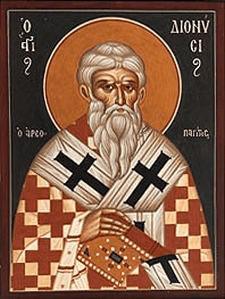The Greek theologian Dionysius the Areopagite has been viewed for centuries as the preeminent Christian authority on angelology, the theological study of angels. The life and work of Saint Dionysius are, to this day, controversial topics; his name is associated with no less than three different individuals, living in the first, third, and, respectively, late fifth century A.D. Also, much of the work traditionally attributed to Saint Dionysius has been criticized for its strong connection to neo-platonic philosophy.
Tradition holds that Saint Dionysius was born in Athens from pagan parents. His interest in philosophy predated his conversion to Christianity, and it was said that he had even traveled to Egypt, meeting with some of the most renowned wise men and scholars of his time. After his baptism, he became one of Saint Paul’s followers. However, the writings traditionally attributed to Saint Dionysius, the Dionysian Corpus, are currently considered to have been composed around the late fifth century.
The Dionysian Corpus has influenced Christian theologians prior to and following the Great Schism, and constitutes a bridge to dialogue between East and West to this day. The second treatise of the Corpus, ‘The Celestial Hierarchy’, is one of the most remarkable products of early Christian thought and Western mysticism in the field of angelic studies. This work proposes a hierarchical classification of angelic beings mentioned in the Scripture, developing a system for employing etymology to deduce the attributes of each class.
 Ultimately, the author maintains that no human mind can ever know with certainty the number, functions, and attributes of the angelic orders. The Holy Scripture is identified as the sole reliable source of information for theological arguments. The author claims that the heavenly angelic hierarchy is an integral part of the governance of Creation. Also, being much closer than humans to the Divine Principle, angels can reflect it, acting as mediators for divine revelation.
Ultimately, the author maintains that no human mind can ever know with certainty the number, functions, and attributes of the angelic orders. The Holy Scripture is identified as the sole reliable source of information for theological arguments. The author claims that the heavenly angelic hierarchy is an integral part of the governance of Creation. Also, being much closer than humans to the Divine Principle, angels can reflect it, acting as mediators for divine revelation.
The Hierarchy identifies nine heavenly choirs of angelic beings, grouped into three major triads. The name of each choir, as presented in the Scripture, is used to determine its role and attributes. The first triad is closest to God, and includes the Seraphim, Cherubim, and Thrones. The name ‘Seraphim’ is translated as ‘those who burn’, or ‘those who purify’. The Cherubim’s name indicates plenary knowledge, or ‘effusion of wisdom’. The Thrones’ name suggests their proximity to the divine throne; such high spirits receive perfection and divine knowledge directly from God.
The second triad consists of Virtues, Dominions, and Powers. These beings are not in direct contact with God’s Divine Light, but receive it through the mediation of the first angelic triad. In turn, the members of the second triad reflect the Light towards their counterparts of the lower, third triad; this third triad includes The Principalities, The Archangels, and The Angels, who can transmit the Light to mortals. The perfection and love of the Creator is perceived fully only by the first triad, and diminishes gradually as it is reflected towards the lesser beings.
Summarizing the duties and attributes of the heavenly choirs, ‘The Celestial Hierarchy’ states that harmony and love are the principles that govern the actions of angelic beings. Their purpose is to assist all creatures in their quest for spiritual elevation, sharing the Divine Light with the lower orders of creation. Angels inspire human beings to live in harmony with each other and the Divine Will, and to persevere in all worthy pursuits as if undertaken in the name of God. Just like the angels, people have a duty to share the Light of God, through their actions, with those who are further removed from it than themselves.
If you’d like to talk with someone familiar with angel readings, give Psychic Barbara a call at 1-866-407-7164. You might also enjoy check out Learn About Angels.

